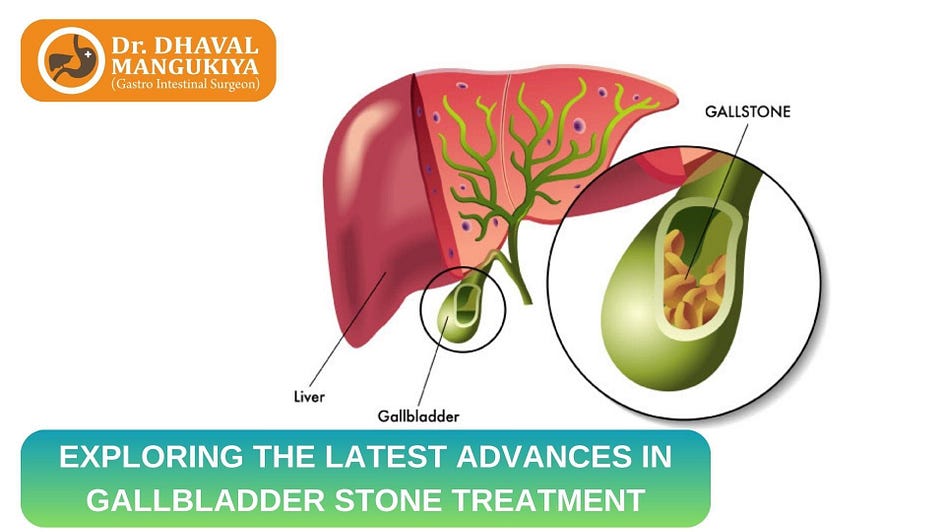Exploring the Latest Advances in Gallbladder Stone Treatment In Surat

Gallbladder stones, also known as gallstones, are a common health issue affecting millions of people worldwide. These stones, formed from hardened digestive fluids, can cause significant discomfort and lead to serious complications if left untreated. Fortunately, advances in medical technology and treatment approaches have made managing gallstones more effective than ever before. In this blog, Dr Dhaval Mangukiya, one of the best gallbladder surgeons in Surat, explores the latest advances in gallstone treatment that are improving patient outcomes and reducing recovery times.
What are Gallstones? How Do They Affect Your Health?
Gallstones are solid particles that form in the gallbladder, a small organ located under the liver that stores bile, a digestive fluid. These stones can vary in size from as small as a grain of sand to as large as a golf ball. Gallstones can block the flow of bile, leading to severe pain, infection, and inflammation. In some cases, they may even cause life-threatening complications such as pancreatitis or gallbladder rupture.
Traditionally, a surgery known as cholecystectomy for removing gallstones, has been the most common treatment for symptomatic gallstones. However, recent advances in medical technology have introduced less invasive options and more precise techniques for providing the best gallbladder stone treatment in Surat which are safer and more comfortable for patients.
Minimally Invasive Surgery: Laparoscopic Cholecystectomy
Laparoscopic cholecystectomy represents a significant advancement in gallstone treatment. Unlike traditional open surgery, which requires a large incision, laparoscopic surgery involves making several small incisions through which a camera and specialised surgical instruments are inserted. The surgeon uses these tools to remove the gallbladder with minimal disruption to surrounding tissues.
As one of the best laparoscopic surgeons in Surat, Dr Dhaval Mangukiya explains the several benefits of this minimally invasive approach:
- Reduced Pain: Smaller incisions result in less post-operative pain, allowing patients to recover more comfortably.
- Quicker Recovery: Patients typically experience a faster recovery time and can return to normal activities sooner.
- Fewer Complications: The risk of infection and other complications is lower compared to traditional open surgery.
The best gastrointestinal surgeons in Surat use laparoscopic cholecystectomy for treating symptomatic gallstones, and ongoing refinements in surgical techniques continue to improve patient outcomes.
Non-Surgical Options: Endoscopic and Medical Treatments
For patients who are not candidates for surgery or prefer non-surgical options, there have been significant advances in endoscopic and medical treatments.
- Endoscopic Retrograde Cholangiopancreatography (ERCP): ERCP is a procedure that combines endoscopy and fluoroscopy to diagnose and treat conditions related to the bile ducts, including gallstones. During ERCP, a flexible tube with a camera is passed through the mouth, down the oesophagus, and into the small intestine, allowing the surgeon to access the bile ducts. Small instruments can then be used to remove gallstones from the ducts without the need for invasive surgery. This procedure is particularly useful for stones that have migrated into the bile ducts, where they can cause blockages and serious complications.
- Oral Dissolution Therapy: For certain types of gallstones, especially cholesterol stones, doctors may prescribe medications that dissolve the stones over time. Ursodeoxycholic acid is one such medication that works by reducing the cholesterol content of bile, gradually dissolving the stones. While this approach is less invasive, it is generally only effective for small stones and requires long-term treatment.
These non-surgical options provide alternative treatments for patients who cannot undergo surgery due to medical reasons or who prefer to avoid surgical procedures.
Shockwave Lithotripsy: Breaking Stones with Sound Waves
Dr Dhaval Mangukiya describes shockwave lithotripsy as another innovative approach to treating gallstones. This non-invasive procedure uses high-energy sound waves to break gallstones into smaller fragments, which can then be passed naturally through the digestive system.
During the procedure, a device called a lithotripter generates shockwaves that are focused on the gallstones. The sound waves travel through the body, breaking the stones into tiny pieces. Patients typically require no anaesthesia, and the procedure is performed on an outpatient basis, allowing them to go home the same day.
While shockwave lithotripsy is not suitable for all types of gallstones, it offers a promising option for patients with smaller stones or those looking for a non-invasive treatment.
Advances in Imaging and Diagnosis
Accurate diagnosis is crucial for effective treatment, and recent advances in imaging technology have greatly improved the ability to detect gallstones and assess their impact on the body. Techniques such as high-resolution ultrasound, magnetic resonance cholangiopancreatography (MRCP), and advanced CT scanning provide detailed images of the gallbladder and bile ducts, allowing doctors to diagnose gallstones with greater precision.
These imaging advances also aid in planning treatment strategies, helping surgeons and physicians determine the best approach for each patient. With better diagnostic tools, the likelihood of successful treatment increases, leading to better overall outcomes for patients.
Conclusion
The field of gallbladder stone treatment has seen significant advancements in recent years, offering patients more effective, less invasive options for managing this common condition. From minimally invasive surgeries like laparoscopic cholecystectomy to innovative non-surgical treatments like ERCP and shockwave lithotripsy, the best gastro surgeons in Surat are leveraging these advances as a standard approach for treating gallstones. And with continued research and technological progress, the future of gallbladder stone treatment looks promising, with even more refined and personalised care options on the horizon.
Comments
Post a Comment